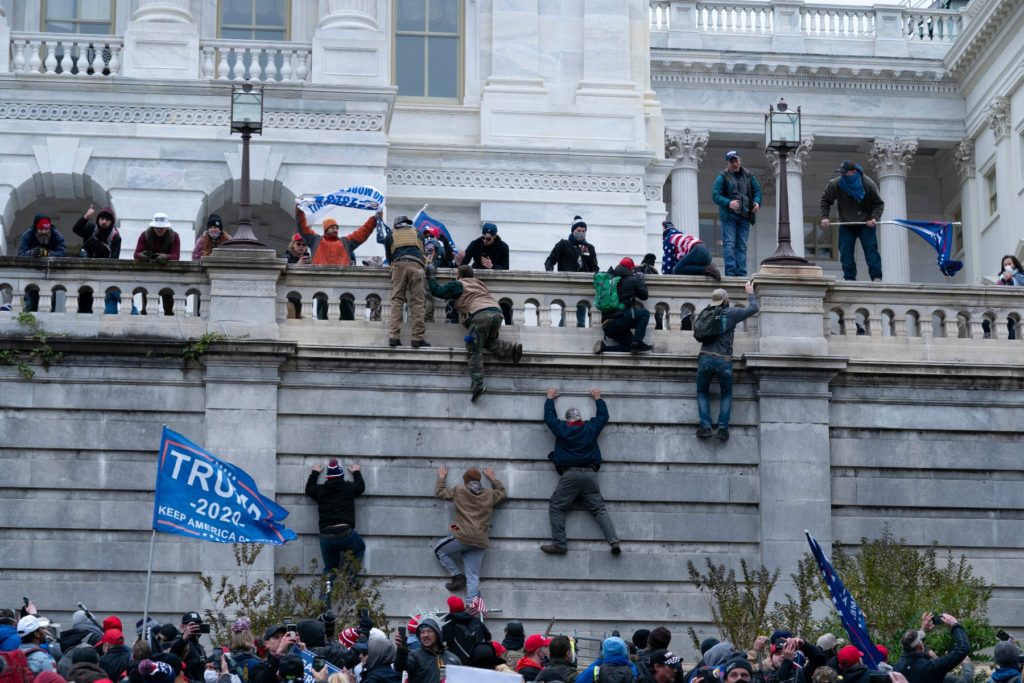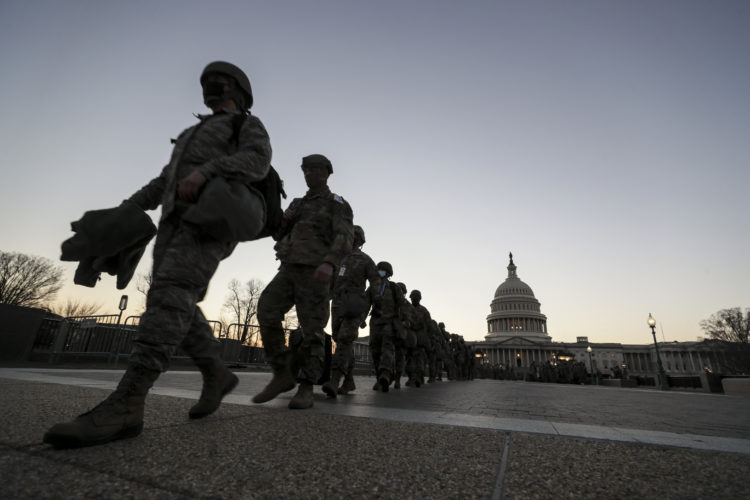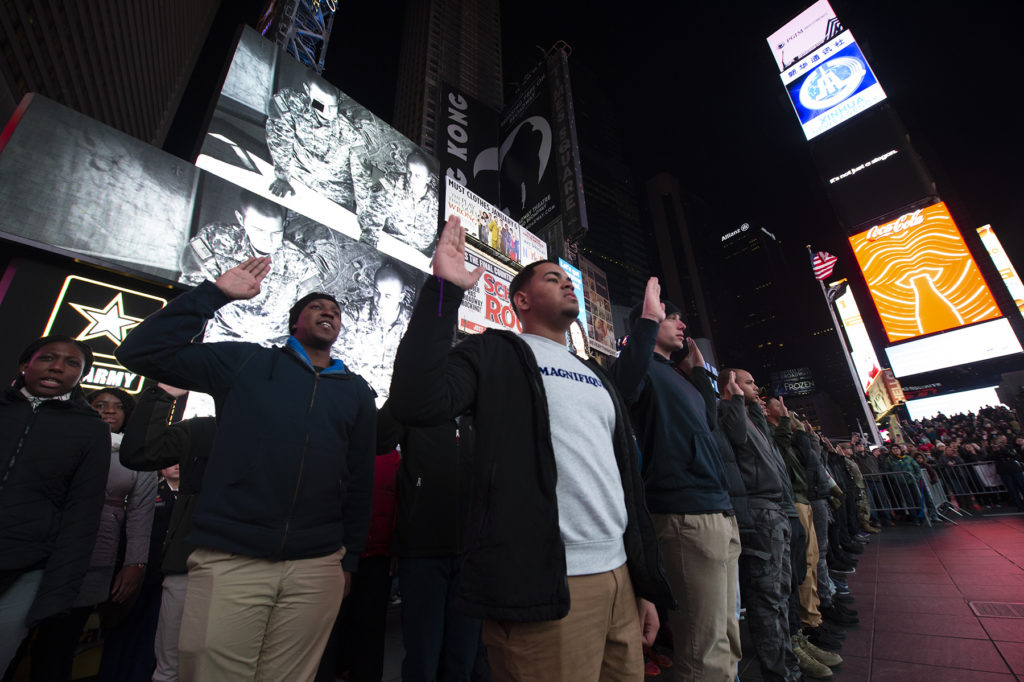In society, we call that “speaking out of both sides of our mouth.” St. James, who wrote an epistle in the Bible some 2,000 years ago, called it being “double-minded.” In other words, people saying one thing but doing another isn’t something new. Based on the individual, solemnly swearing to an oath and living by that oath can look very different in practice.
Growing up, my dad — a retired policeman — used to always say to us, “locks are only for honest people.” We, at first, always wondered what he meant by that, but one day he explained to us that the only person a lock stops is someone who’s honest. Someone who wants to break into your house will kick the door off the frame and someone who wants to get inside your vehicle will just break the window.
“Locks are for honest people.” So are oaths. Oaths are for people who find meaning in their words. Otherwise, it is nothing more than a meaningless, blathering monologue.
Let’s assume for this argument, though, that the people (the protestors, law enforcement officers, the prosecutors, and federal investigators) involved in every facet of the Capitol event of January 6, 2021, believe the words they swore to and that many of them desire(d) to uphold their Oath of Office. How can one side seemingly be getting it so wrong then? Or are they both partially right?
To be clear, what I’m not discussing in this article are fringe groups or hate groups who participated in the rally. Everyone knows their objective is to get their name in the media and they oftentimes mindlessly participate in and rally for events they couldn’t care less about at their core. You know, “Never let a tragedy go to waste.” Instead, I’m interested in the people who believe to their core that what they did was both constitutional and necessary.

Peaceful Does Not Mean Lawful
I’ll be honest, I’m a patriot.
I love America and what it stands for. I also love law and order and I believe our country is only able to thrive because of it. What I saw on January 6 was a complete societal breakdown of law and order, in addition to some questionable overall law enforcement tactics. To be fair, though, man, do I not envy those Capitol police officers who decided to take a stand, do their job and hold their positions. That took a lot of guts and they should be commended for it. Good job, fellas.
When discussing my view of the actions that occurred on January 6, 2021, I’d first like to make a distinction between the terms “peacefully” and “lawfully.”
Peacefulness and lawfulness are not dependent on one another to exist. I could peacefully burglarize someone’s house, but I couldn’t do it lawfully. Conversely, I could lawfully punch someone in the face who had attacked me, but that wouldn’t be peaceful. It could be considered righteous, but not peaceful. My point is that those are two distinct terms and we should consider that fully when considering the actions of people on January 6.
I’ve heard it argued by friends that many of the people who entered the Capitol did so “peacefully” so they shouldn’t be held accountable for what happened. They say they were “let in.” Regardless of how they made entry into the building (peacefully or with force), every protestor who entered the Capitol that day did so unlawfully. Even when considering their actions from a reasonableness standpoint, which is commonly used in legal scenarios, would a reasonable person have believed on January 5, 2021, that they could simply walk in the front door of the U.S. Capitol building and sit at the vice president’s desk? No. So, from even the most basic of legal arguments, almost anyone in a law profession would consider their entry unlawful.
So, regardless of their motives, they broke the law by entering the building.
There were also many protestors that entered the Capitol who gained access by attacking the Capitol Police, injuring many, and killing at least one officer. It is appalling any time someone attacks police officers. As I said above, I’m pro-law and order and think it is the fabric that holds our country together. I’m 100 percent not saying there should have been violence; in fact, as a former police officer, I’m disgusted that so many officers were hurt while just trying to do their job. In addition, storming a federal building because something happened that you don’t like isn’t how America works. Our first response to thoughts of voter fraud or election tampering shouldn’t to storm Congress.
I do have serious questions as to the motives of those whom I saw fight to get into the Capitol building but do nothing of consequence once inside. If, in your mind, the situation in America was so dire that you needed to attack police officers and storm Congress, then why was the only footage I saw on TV of people taking selfies in the vice president’s chair or while standing at the speaker of the House’s lectern? If America’s situation was that dire, then why didn’t I see any evidence that you were there for any reason other than publicity and photo ops? Again, I think this was a totally incorrect approach to take either way, but I can’t wrap my head around the purpose of the “riot” from their perspective.
Based on the information I’ve seen in various news reports and from footage released from that day, the only conclusion I can draw is that most people who entered the Capitol wanted only to peacock around Congress and claim a non-existent victory; not to better America. I don’t think the protestors entered the U.S. Capitol building that day to “save America” or to “support and defend the Constitution against all enemies, foreign and domestic.” I think many of them did it for views on social media or for the unique experience. I heard of some pastors who went to the Capitol grounds (but did not unlawfully enter the building) to pray for America: that was an appropriate action. I saw some on TV that stood outside with signs and protested and that too was appropriate. And then I saw people who unlawfully entered the Capitol wearing tactical gear, or dressed like Daniel Boone, or were shirtless and wearing animal horns. Those people aren’t the saviors of America, they are the laughing stock of America.
And they ultimately did significant harm to their stated goal.
Those people accomplished nothing while there, got arrested (eventually), and ultimately ruined their lives. Even with a relatively incompetent response from Capitol Police as a whole, we still saw the protestors fail at each of their ultimate goals. Joe Biden was confirmed as the next president, and those in Congress now have something to stand on to label more people domestic terrorists. Even since his inauguration, President Biden’s administration has begun to consider labeling “former police and military” as possible domestic terrorists. Thanks a lot, coonskin cap guy and shirtless Viking horn hat guy. You guys really made a positive impact.
If we ever had to rely on these people to “save our Republic” then we’re screwed.
I don’t think Paul Revere, while actually saving the Republic, would have made time to livestream his midnight ride on Twitch. Neither did one of the other “Five Riders,” the great American Patriot Israel Bissell. Bissell made the longest ride of the campaign in April 1775. While Revere’s brave and historic ride covered about a dozen miles, Bissell’s midnight ride along the Old Post Road covered some 345 miles in just over four days. Along the trail Bissell purportedly yelled, “To arms, to arms, the war has begun!”
Men like these stood for a cause; not just to gain popularity or notoriety. They also did so at great personal risk. They are the face of patriots.
What I do believe is that people should stop using vague terms and false concepts to justify their actions.
In Ferguson, Missouri in 2014, we saw the mantra “Hands Up, Don’t Shoot!” even though it was proven by federal investigators that Michael Brown’s hands never went up. On January 6, 2021, many of the people interviewed said that they came out to stop a “rigged” election or to ensure the future success of America by adhering to their “Oath of Office.” From the outside looking in, though, I just don’t see any overwhelming evidence that the people who fought to get into the Capitol did so for righteous reasons. If their motives were righteous, they were at the very least poorly thought-out.
As I said above, I’m a true American patriot and I believe that we need to hold our elected officials accountable. I also believe that our vote needs to count as one vote; not 70 percent of a vote or 130 percent of a vote as has been alleged by some. But, America needs law and order to remain great. Rather than hiding behind vague justifications for divisive actions, Americans need to take every legal step they can to ensure America stays great. Actions like those that happened on January 6, 2021, have no place in the steps of that process. And Americans should make sure they aren’t hiding behind their “Oath” as a justification for their actions that day.











COMMENTS